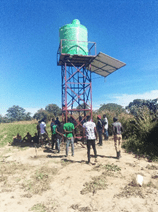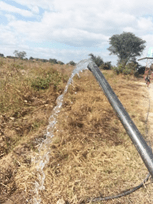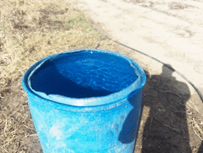Water is an invaluable resource - used daily and integrated into every part of our lives. It nourishes our body, supports hygienic and sanitation practices, and is critical for crop production and sustaining food resources. Our very livelihoods depend on it, and sadly, it is something heavily taken for granted by so many.
While there are billions of people all over the globe with access to safe and readily available water, according to a report by the World Health Organization (WHO) and the United Nations Children’s Emergency Fund (UNICEF), there are at least 2.1 billion people who lack access to safe, readily available water at home, and at least 4.5 billion people who lack safely managed sanitation. (Source: WHO and UNICEF) So what does this mean?, it means that for many communities all over the world, even if they do identify a water source, which oftentimes can be a several mile trek to access it, the water is likely infested with disease-causing organisms that can easily cause more harm than good.
“Safe water, sanitation and hygiene at home should not be a privilege of only those who are rich or live in urban centres,” says Dr Tedros Adhanom Ghebreyesus, WHO Director-General. “These are some of the most basic requirements for human health, and all countries have a responsibility to ensure that everyone can access them.” (Source: WHO and UNICEF)

The World Forgotten Children Foundation (WFCF) couldn’t agree more, especially in times like these during the COVID-19 pandemic when proper sanitation and hygiene are some of the most critical ways to stop the spread of this highly contagious virus. And as such, roughly two years ago, WFCF expanded its mission to support vulnerable regions through community development and sustainability initiatives in developing countries. One of its first major projects under this expanded mission began in Fall of 2020, when WFCF funded a total of US $6,050 for the purpose of installing a solar-powered water system to provide a reliable and safe water source at the Republic of Hope’s Garden and Orchard Complex in Zimba District, Southern Province, Zambia.

The project was inspired by the recent United Nations World Water Development Report, Leaving no one behind, launched on March 19, 2019 during the 40th session of the United Nations Human Rights Council (UNHRC). The report stresses how improvements in water resources management and access to water supply and sanitation services are essential to addressing various social and economic inequities, such that ‘no one is left behind’ when it comes to enjoying the multiple benefits and opportunities that water provides. Additionally, many women in the nearby rural community in the Zimba District (many who are head of their households), were experiencing tremendous difficulties providing for their families as their access to clean drinking water and food sources was extremely limited. The women had been forced to lead highly sacrificial lives to care for those who are struggling in their community, oftentimes taking temporary odd jobs or walking for miles to access the resources they so desperately need. And thus, a solution such as a reliable water source, would provide the opportunity to produce vegetables and fruits for their families while also selling some of these crops to support the livelihood and betterment of their community.
The project was executed in three separate phases with the first phase focused on applying and paying for all necessary permits; the second phase included meeting with a well drilling contractor, setting drilling dates, and then actually starting the drilling process along with installing a steel liner and pouring concrete; and the final phase included the conclusion of drilling to an adequate level, and the installation of the pump, tank, solar panels and controlling switches.
In addition to the installation process for the water system, other steps were taken including:
- The installation of a fence perimeter to protect the section from stray animals and also from theft. Also, a storeroom and security post were built as solar panels have been heavily targeted by thieves. This also supports with tool storage and provides a space for caretakers.
- Irrigation system piping which supports the orchard development through a drip feed watering system.
- Strategic crop planning and the purchase of seeds and fruit and nut trees, specifically planning for the planting of crops that can yield income generation such as oranges, guavas, bananas, grapes, lemons, and avocados.
- The purchase of various equipment including wheelbarrows, garden hoes, shovels, garden spades, watering cans, propagation equipment.
- The development of a nursery which includes an assortment of trees to be planted for demonstration, selling, and community education.
- Locating areas that can be used for water retention during the wet season.

The project was completed by the end of March 2021 and African Community Project is now in the process of mentoring and handing over the project to the steering committee under the leadership of Passwell Nyambe. As the project matures, chickens and other farm animals can be added to enhance the products produced. An additional supplementary project is also planned, an apiary with space for up to 20 beehives, aimed to create a strategic security livelihood alternative that should help in conserving the natural forestry and tree planning. Plans also included a demonstration and training site and hiring a trainer in organic beekeeping to conduct week-long hands-on training of the community people.
We are certain that this is just the start of WFCF supporting major projects that offer tremendous sustainable value to those in underdeveloped regions and are looking forward to supporting similar projects in the future.
WFCF is inviting NGOs and not-for-profit organizations that support the aforementioned communities to submit their projects for funding consideration to WFCF at help@world-forgotten-children.org.
Sources:
United Nations. (18 March, 2019). World Water Development Report 2019. Retrieved August 2, 2021, from https://www.unwater.org/publications/world-water-development-report-2019/
World Health Organization. (12 July, 2017). 2.1 billion people lack safe drinking water at home, more than twice as many lack safe sanitation. Retrieved August 2, 2021, from https://www.who.int/news/item/12-07-2017-2-1-billion-people-lack-safe-drinking-water-at-home-more-than-twice-as-many-lack-safe-sanitation


